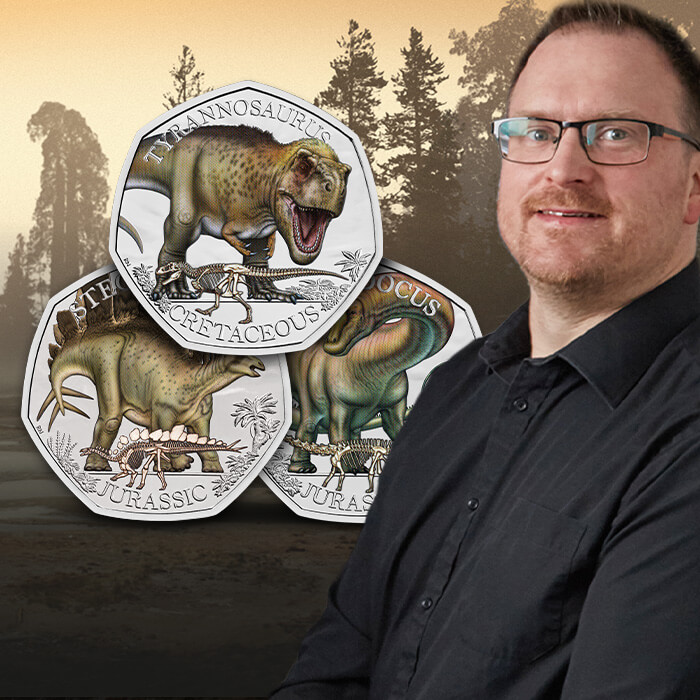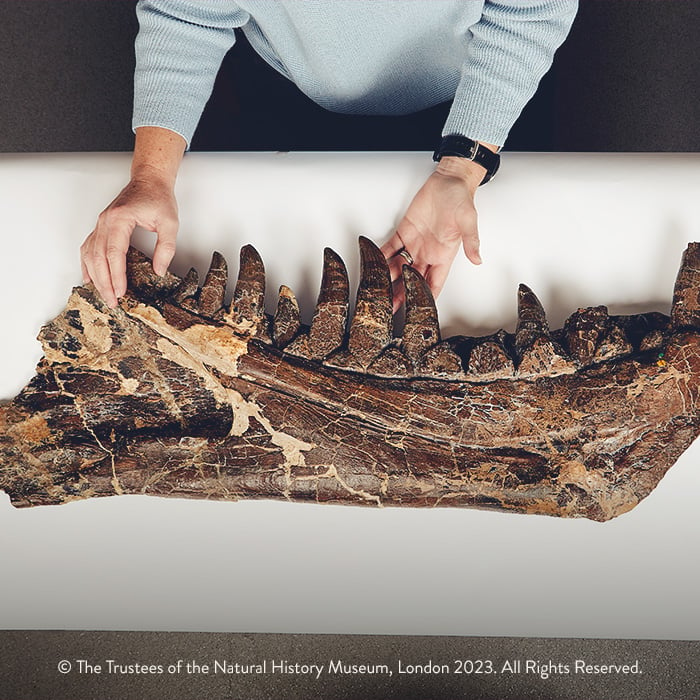Tales of the Earth returns to The Royal Mint with three new coins celebrating some of the most iconic dinosaur specimens to roam the planet.
![]()
Since its arrival in 2020, Tales of the Earth has been one of our most popular releases in recent years, appealing to both adults and children alike. Now, it returns with three new coins featuring a fresh set of designs dedicated to some of the most legendary dinosaurs of all time. Collectively titled ‘Iconic Specimens’, this new collection celebrates some of the most incredible dinosaurs amongst the Natural History Museum’s comprehensive library of specimens, namely three groundbreaking discoveries in the field of palaeontology.
The first coin focuses on one of the most fearsome and formidable dinosaurs of all time, Tyrannosaurus. A monstrous creature from the Late Cretaceous period, Tyrannosaurus is one of the most well-known prehistoric creatures to roam the Earth, featuring in countless movies, television shows and books since its discovery in the early 1900s – and with good reason. More than 12 metres long and weighing around 6.5 tonnes, the colossal predator was a threatening presence that could gorge on as much as 75 kilogrammes of meat in a single day. Unearthed by Barnum Brown, a renowned fossil hunter, in 1900, the specimen held at the Natural History Museum is the world’s first known discovery of Tyrannosaurus remains.
Following this iconic creature is the equally iconic Stegosaurus. A hulking herbivore of the Jurassic Period, Stegosaurus lived 150 million years ago, inhabiting the same land as Allosaurus, Diplodocus and Brontosaurus. Whilst Stegosaurus is immediately distinguishable by the sizeable plates that line its spine, it wasn’t a particularly clever creature. With a disproportionately small head compared to the rest of its body, it had an equally diminutive brain around the size of a plum. Nevertheless, Stegosaurus is a firm favourite amongst dinosaur fans. Fondly nicknamed ‘Sophie’, the world’s most complete Stegosaurus skeleton ever found is on display at the Natural History Museum in London for the public to view in all its glory.
![]()
Finally, the last coin in the Iconic Specimens collection is dedicated to another notable and recognisable dinosaur, the sauropod known as Diplodocus. Another creature from the Jurassic Period, Diplodocus is known for its long neck, barrel-shaped body, thick, pillar-like legs, and long slender tail. In fact, it was one of the longest dinosaurs to exist – with one species growing up to 33 metres in length – and could consume over 100 kilogrammes of vegetation every day. Created at Edward VII’s request, the full-scale cast of Diplodocus owned by the Natural History Museum is one of the most famous dinosaur exhibits in the United Kingdom. Fondly known as ‘Dippy’, the skeleton has toured the country extensively in recent years, allowing millions of people across the UK to view this amazing specimen up close.
Each coin in the collection features a reverse design by renowned palaeo-artist Robert Nicholls. Alongside his legacy within the world of palaeontological art, particularly in the UK, his name may be familiar to collectors of the previous Tales of the Earth coins, as the artist’s designs also feature on our existing Dinosauria and Mary Anning coins too. Benefitting from Robert Nicholls’ extensive knowledge of the subject matter with the expert guidance of Professor Paul Barrett from the Natural History Museum, each design is accurate down to the smallest detail.
Featuring three of the most prominent dinosaurs in world history, the Iconic Specimens collection is sure to be a popular addition to our beloved Tales of the Earth collections. Own these incredible specimens for yourself by signing up to receive all three coins and bring the awe and wonder of the dinosaur kingdom to your coin collection. Each coin will be despatched as soon as possible upon launch and payment will automatically be taken when each coin is released.
Be Inspired

Unearthing Tyrannosaurus
Read More
CELEBRATING ICONIC SPECIMENS
Discover the Designs
How well do you know dinosaurs?
Take the Quiz